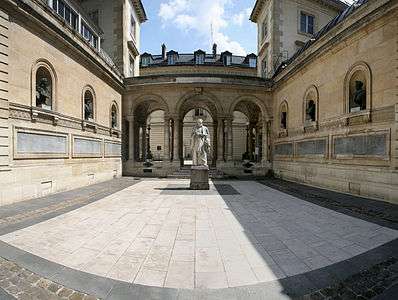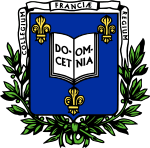Collège de France
|
Coat of arms of the Collège de France, given by letters patent in 1699 | |
| Latin: Collegium Franciæ Regium | |
Former names | Collège Royal |
|---|---|
| Motto | Docet omnia (Latin) |
Motto in English | Teaches all |
| Type | Public |
| Established | 1530 (royal charter) |
| Founder | Francis I of France |
| Administrator | Alain Prochiantz |
Academic staff | 47 chairs (2016) |
| Location |
Paris, France Coordinates: 48°50′57″N 002°20′44″E / 48.84917°N 2.34556°E |
| Campus | Urban |
| Website |
www |
The Collège de France (French pronunciation: [kɔlɛʒ də fʁɑ̃s]), founded in 1530, is a renowned higher education and research establishment (grand établissement) in France. It is located in Paris, in the 5th arrondissement, or Latin Quarter, across the street from the historical campus of La Sorbonne.
The Collège does not grant degrees. Each professor is required to give lectures where attendance is free and open to anyone. Professors, about 50 in number, are chosen by the professors themselves, from a variety of disciplines, in both science and the humanities. The motto of the Collège is Docet Omnia, Latin for "It teaches everything"; its goal is to "teach science in the making" and can be best summed up by Maurice Merleau-Ponty's phrase: "Not acquired truths, but the idea of a free research"[1] which is inscribed in golden letters above the main hall.
The Collège has research laboratories and one of the best research libraries of Europe, with sections focusing on history with rare books, humanities, social sciences and also chemistry and physics.
As of June 2009, over 650 audio podcasts of Collège de France lectures are available on iTunes. Some are also available in English and Chinese. Similarly, the Collège de France's website hosts several videos of classes. The classes are followed by various students, from senior researchers to PhD or master students, or even bachelor students. Moreover, the "leçons inaugurales" (first lesson) are important events in Paris intellectual and social life and attract a very large public of curious Parisians.
-
The front door of the Collège de France -

Standing statue of Guillaume Budé in the courtyard of the Collège de France -

The Collège in 1612 by Claude Chastillon (1559-1616)
History
The Collège was established by King Francis I of France, modeled after the Collegium Trilingue in Louvain, at the urging of Guillaume Budé. Of humanist inspiration, the school was established as an alternative to the Sorbonne to promote such disciplines as Hebrew, Ancient Greek (the first teacher being the celebrated scholar Janus Lascaris) and Mathematics.[2] Initially called Collège Royal, and later Collège des Trois Langues (Latin: Collegium Trilingue), Collège National, and Collège Impérial, it was named Collège de France in 1870.
Faculty
The faculty of the Collège de France currently comprises fifty-two Professors, elected by the Professors themselves from among Francophone scholars in subjects including mathematics, physics, chemistry, biology, history, archaeology, linguistics, oriental studies, philosophy, the social sciences and other fields. Two chairs are reserved for foreign scholars who are invited to give lectures.
Notable faculty members include Serge Haroche, awarded with Nobel Prize in Physics in 2012. Noticeably, 8 Fields medal winners have been affiliated with the College.
Past faculty include:
See also
References
- ↑ "Non pas des vérités acquises, mais l'idée d'une recherche libre". The entire sentence is in fact: "Ce que le Collège de France, depuis sa fondation, est chargé de donner à ses auditeurs, ce ne sont pas des vérités acquises, c'est l'idée d'une recherche libre." From Merleau-Ponty's inaugural lecture at the Collège de France, reproduced in: Maurice Merleau-Ponty, Éloge de la philosophie et autres essais, Paris: Gallimard, 1989, p. 13.
- ↑ Byzance et l'Europe : Colloque à la Maison de l'Europe, Paris, 22 avril 1994, H. Antoniadis-Bibicou (Ed.), 2001, ISBN/ISSN/EAN: 291142720.
- ↑ "Anne Cheng Biographie." Collège de France. Retrieved on 11 December 2013.
- ↑ (French) Biography at Collège de France website
- ↑ (French) Nécrologie de M. Jean Yoyotte (1927-2009) par Christiane Zivie-Coche
External links
| Wikimedia Commons has media related to Collège de France. |
- Collège de France website, English home page
